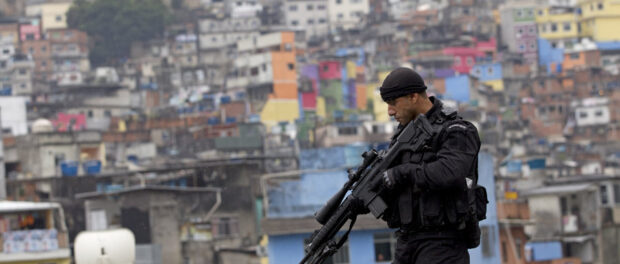
Since 2008, when the first Pacifying Police Unit (UPP) began occupying the Santa Marta favela, Rio de Janeiro’s state government has pursued aggressive policies to combat organized crime related to the drug trade and bring favelas under formal government control resulting in the deaths of thousands of civilians often at the hands of Military Police. Almost ten years after the first favela pacification effort, violent clashes between police and traffickers are only escalating and have resulted in collateral damage primarily in underserved and marginalized communities in Rio’s North and West zones.
Despite a high death toll and numerous human rights abuses, city residents outside these areas remain largely indifferent to the failures of these policies and their consequences for civilians. In order to combat this indifference and incorporate a larger portion of Rio’s population in the search for solutions to these issues, the Central Student Directory (CSD) of Rio de Janeiro’s Pontifical Catholic University (PUC-Rio) hosted a debate to discuss the War on Drugs in Rio on Wednesday, June 7. The debate brought together Orlando Zaconne of Law Enforcement for Legalization (LEAP Brazil), Vivi Salles, a sociologist and resident of City of God, Tatiana Lima, journalist and resident of Complexo de Alemão, and Victoria de Sulocki, professor of Criminal Law and Human Rights at PUC- Rio, who shared their perspectives and knowledge in an open forum. After a short discussion by these speakers, the forum was opened up for questions by attendants.
One of the primary shortcomings of the War on Drugs debated by the group, is the inconsistency and clear bias shown in the governments’ approach to drug enforcement. The drug trade involves a wide network of producers, distributors and consumers, as well as a robust financial system to launder millions of dollars a year. Yet police choose to focus their efforts solely in low-income communities with historically marginalized populations. As Zaconne stated, “Who is behind the major drug trade? It’s the financial system. They launder all that money. They hide the fifth largest economy in the world under a mattress.” This selective approach to drug enforcement perpetuates drug violence by failing to address the principal sources of the drug market such as financial intermediaries, distributors, and consumers who often reside in more affluent neighborhoods. In addition, these actions serve to reinforce inaccurate stereotypes against favela residents and create a system of violent repression that is motivated by racial and class-based prejudice. Zaconne continued to describe this selective approach as “one of the pillars of discrimination.”
Favela residents who are disproportionately affected by drug enforcement policies often fall victim to the violent and unreliable Brazilian justice system. Despite the fact that Brazil does not have a death penalty, hundreds of Rio residents are killed every year at the hands of law enforcement. Last year, police killed at least 920 people in Rio and 2017 is on course to beat that number. The yearly death toll is so high that Rio’s police are known as the most violent in the world. During the debate Zaconne commented, “The death penalty in Brazil still exists; it is protected and legitimized by politicians,” referring to political dialogue which often excuses police violence as a necessary evil.
While self-defense is often claimed as the reason for these killings, Amnesty International and The Guardian have both documented multiple instances of police planting arms and drugs on victims to avoid punishment for their excessive use of force. Meanwhile, suspects who are arrested enter the poorly regulated prison system where abuses by other prisoners as well as officials contribute to the cycle of oppression. So far in 2017, there have been at least 140 deaths within Brazil’s prisons which are largely controlled by gangs. Not only does law enforcement perpetuate these trends through their failure to effectively prevent prison violence, but they also contribute to them through the use of torture against suspects in violation of Brazilian law and human rights.
Women, who are arrested on non-violent drug charges more than any other crime, are particularly vulnerable to sexual assault and other forms of abuse by inmates and officials. Zaconne describes the experience of women in the Brazilian prison system: “when you incarcerate a woman, you are placing her into a house of torture because that’s what prisons are in Brazil.”
After nearly ten years of failed policies and systemic violence as a result of the UPP War on Drugs, large portions of Rio society have become complacent to abuses of power and accepting of the serious flaws in drug policies. National media has contributed to this apathy by creating a societal divide through inaccurate reporting and misrepresentation of favela communities. In order to combat desensitization and create reforms which allow for more effective policies and greater respect for human rights, civil society utilizes social media resources to remain informed about the War on Drugs, combat inaccurate narratives created by government officials and national media, and stand in solidarity with effected communities as a resource and proponent of progress. Lima commented on the crucial role civil society plays in filling the narrative gap left by government and national media: “We are the media. Every one of us has Facebook, Twitter, Tumbler and all that stuff. We produce discourses, tell stories and begin to construct Rio.” She went on to stress the importance of forming relationships between favelas and formal communities to cultivate empathy and awareness.


